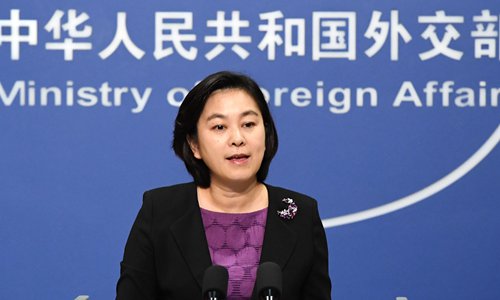
Foreign Ministry spokesperson Hua Chunying speaks at a daily breifing. (File photo: VCG)
China urged Canada to "make the right choice" on Thursday, after Canada's ambassador to China John McCallum reportedly said the Huawei executive arrested in Vancouver at the request of the US has a strong case to fight extradition.
"Any one with normal judgment can see the nature of the incident, and we hope the Canadian side makes the right choice and not to 'pull someone's chestnuts out of the fire,'" Foreign Ministry spokesperson Hua Chunying said at a daily briefing on Thursday.
Hua's remark comes after McCallum told reporters earlier this week that Huawei's chief finance officer Meng Wanzhou has a "strong case" to fight an extradition request.
"I think she has quite good arguments on her side," said McCallum, CNN reported.
"One, political involvement by comments from US President Donald Trump in her case. Two, there's an extraterritorial aspect to her case; and three, there's the issue of Iran sanctions which are involved in her case, and Canada did not sign on to these sanctions."
Echoing McCallum, Huang Feng, director of Beijing Normal University's Institute for International Criminal Law, noted that the US extradition request has no merit as it does not follow the basic extradition principle of double criminality.
Double criminality states that a suspect could be extradited only if similar laws one breaks exist in the extraditing country. However, Canada has no such sanctions, said Huang.
Analysts stressed that even if the US files an extradition request at the last minute, it does not mean Meng would be extradited to the US, noting that every side has to weight their choice.
Such a request has to be reviewed and approved by Canada's judicial department and local court, and though Canada's judicial departments are unlikely to refuse the extradition, Huawei's legal teams could exhaust every means of judicial remedy in Canada to stop the extradition.
The US government alleges that Meng helped Huawei dodge US sanctions on Iran and has indicated it will file a formal extradition request by the January 30 deadline, CNN reported Thursday.
Wu Xinbo, director of Fudan University's Center for American Studies, told the Global Times that if Canada does agree to extradite Meng to the US in the worst scenario, bilateral ties will face unprecedented challenges.
The extradition will cause "downgraded diplomatic relations" between China and Canada, Wu said.
It will set a precedent of enterprises facing the harshest legal punishment for alleged misconduct they are charged of in a foreign country, said Wu.
US enterprises may face similar consequences in China, he said.
The current status of China-Canada relations does have a huge impact on bilateral exchanges and cooperation, but China is not responsible for that, Hua said.
The Canadian side has to take China's concerns seriously and correct its mistakes to change the situation, she said.


